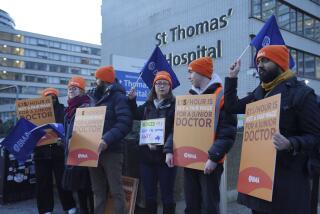Study Says Health Benefits Are Key Issue in Strikes : Labor: Disputes over medical coverage motivated 78% of strikers in 1989, the report finds.
- Share via
WASHINGTON — The percentage of strikers who walked off the job over health benefits more than quadrupled during the late 1980s as soaring medical costs led to a breakdown in labor-management relations, a union report said Monday.
A study by the 925,000-member Service Employees Union found that disputes over health coverage motivated 78% of the strikers in 1989. In 1986, health benefits were a prime factor for only 18% of the strikers whose motivations could be determined.
In 1989 alone, strikes over health coverage cost the economy $1.1 billion in lost wages, said the study, which was based on statistics from the Labor Department and the private Bureau of National Affairs.
The study concluded that “both sides are losing” in the battle over health benefits and called for united action on health-care reform.
“Rapidly rising health-care costs in the 1980s have fueled an escalating breakdown in labor-management relations,” it said.
“Looking ahead to the 1990s, continued double-digit health care cost inflation threatens our country with escalating labor unrest and the eventual destruction of employer-provided health insurance as the major vehicle for providing health coverage.”
Much of the increase in benefits-related strikes in 1989 can be attributed to the walkout by more than 150,000 workers against the regional telephone companies, said John Howley, senior policy analyst with the service workers.
The phone workers represented about a third of the 432,600 strikers during the first 10 months of 1989, the period for which statistics were available, he said. There were 506,200 strikers in all of 1986.
The study examined strikes involving more than 1,000 workers each. Using news reports and interviews with strikers, it determined causes for walkouts involving 79% of strikers in 1986 and 97% of strikers in 1989. Only strikes for which causes were determined were included in the report.
The study said labor and management negotiated health benefits for 40 years without serious disputes. But recently, it said, employers “in desperation” have tried to shift rising health costs to workers, fueling unrest.
The report said workers covered by plans with cost sharing paid 6.6% of their after-tax earnings for health premiums in 1988. It predicted that if current trends continue, the figure would rise to 27% by 1998.
Sharon Canner, National Assn. of Manufacturers assistant vice president of industrial relations, said employers agree that reforms are necessary to control health-care costs and stave off future strike activity.
“You just can’t indefinitely expand employee share. Particularly at lower income, there are people who just can’t bear the freight,” she said. “We have had a lot of conversations with labor. I think we agree on what the problems are. We differ on the solutions.”
More to Read
Sign up for Essential California
The most important California stories and recommendations in your inbox every morning.
You may occasionally receive promotional content from the Los Angeles Times.













